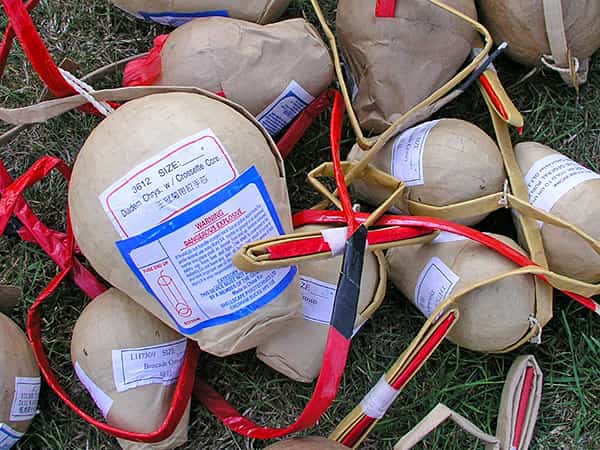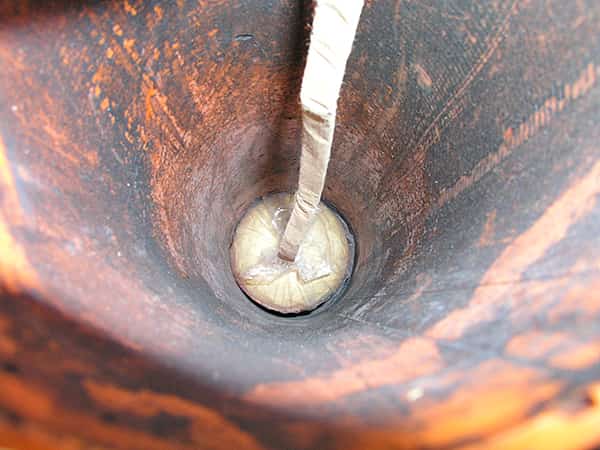Fireworks Guide: Aerial Shells & Category F4 Fireworks
Bigger fireworks intended for professional use only.
Key information
- Category F4 is the professional category of fireworks.
- F4 encompasses a broad range of fireworks used in professional fireworks shows by trained personal.
- Often referred to as “industrial fireworks” by the press.
- Not available to the public.
- No licence exists or can be purchased, nor any training undertaken, by members of the public that entitles them to buy F4 fireworks for home use despite persistent urban myths to the contrary.
- Aerial shells are single, large, explosive effects that fire from a mortar tube and make up the majority of big sky effects in a professional show (pros rarely use consumer rockets).
- Guides to other types of fireworks can be found in the Firework Guides main menu.
Category F4 vs. F2 and F3
Category F2 and F3 refers to consumer fireworks, with F2 having safety distances typically between 8m and 15m, and F3 having a safety distance of 25m (and more gunpowder!).
Above this we move into professional fireworks, known as Category F4. The press have sometimes refered to these as “industrial fireworks” and the term has stuck, though this term is not used within the fireworks trade.
Category F4 fireworks cover a broad range of different items – well beyond the scope of this consumer guide – including aerial shells. These often do not have a specific safety distance and it is down to the operator to ensure safe usage (mostly at distances far greater than F3’s 25m). Many also don’t come with a safety fuse either, with the intention of being fused together or electrically fired. This is why stolen Category F4 fireworks are so dangerous if sold to the public; any fuse on them is likely to be an instant fuse known as quickmatch.

The mythical Category F4 licence
It is very common for firework enthusiasts to want to move up the pyro ladder from F3 cakes and rockets to larger F4 shells and other professional fireworks. For some reason there is a persistent belief that some form of “licence” is available – either through purchasing it or through training – that enables a member of the public to legally buy F4 fireworks. This is not, and never has been, the case.
F4 fireworks are not for sale to the public under any circumstances irrespective of your level of training or experience with fireworks and no licence or course exists that would enable you to obtain them.
F4 fireworks can only be purchased – and used – by professional display operators as part of their commercial display activities. In case you’re thinking “Can I set up a firework company and buy F4 fireworks through that?” (we’ve all been there with that thought!), the answer is no. A “bonafide” professional fireworks display company as defined by suppliers of F4 would be one with licensed storage (expensive), insurance (expensive) and provable expertise and training by the industry’s BPA (British Pyrotechnists Association) body or an equivalent in order to demonstrate they are “persons with specialist knowledge”.
So professional fireworks really are off-limits to the public. I would imagine that additional confusion arises because firework retailers must apply for a license to sell consumer fireworks all year, plus license their storage. However these licences are completely unrelated to the use of F4 fireworks.
Aerial shells
Although F4 covers too broad a range of fireworks for this consumer guide, it is worth mentioning aerial shells, a common Category F4 firework.
Shells are ball or cylinder shaped fireworks which detonate in the air with one big bang and an ejection of effects. They are launched from a mortar tube by a detonation of their attached lifting charge. Ranging in size from a few inches in diameter to around 16 inches (though changes in the industry in recent years means that 7 inches is typically the largest that it is practical for most operators to store and use), they form the majority of big aerial effects you’ll see in a larger professional show.


Most professionals don’t use rockets (like the consumer rockets you can buy for home displays) because shells, despite their bigger explosive payloads, are considered safer. This is because little or no fall out is produced by a shell (unlike a falling stick from a consumer rocket), they are more predictable in flight and they are less affected by the wind.
This begs the question, why do consumers have to use rockets with big sticks if shells produce virtually no fall out? Well there was a point in the late nineties and earlier when aerial shells were legal for the public to buy in the UK. However a couple of fatal accidents involving the public using these resulted in a ban.
The danger with shells in the public’s hands is that you have a projectile which could weigh several kilograms being fired from a tube at several hundred miles an hour. Being hit by that alone could be fatal should your head be over the tube. This is simply not a firework that can be sold to anyone because without sufficient training they’re potentially lethal as sadly some accidents in the 1990s proved.
These dangers simply do not exist with consumer rockets, even ones containing a small aerial shell as the effect. Even if a consumer rocket gets stuck in the tube and blows up there, you’ll still have a warning delay of the fuse burn time plus the rocket flight time combined (usually enough time to run!).
Whether there should have been a compromise – with small shells say up to a few inches being legal for consumers – is still hotly debated by firework enthusiasts in my Fireworks Forum.
Category F4, "industrial fireworks" and aerial shells FAQ
There isn't one. It's a persistent urban myth that a member of the public in the UK can buy or train for a licence to purchase or use Category F4 professional fireworks at home. These fireworks are only for sale to bona-fide professional display companies.
As a member of the public in the UK there is no training you can do which would allow you to legally buy or use Category F4 professional fireworks at home. Firers employed by professional companies can train to become qualified firers but that still doesn't allow them to purchase F4 fireworks to use outside of the displays they are paid to undertake for their company.
Category F4 covers a broad range of fireworks that are for professional use only. These include aerial shells (which are completely banned for use by members of the public) and cakes or candles that are too big to be classified as F2/F3 consumer fireworks.
The UK tabloid press has coined their own term of "industrial fireworks" for any firework which is professional-use only, or anything they consider too big for the public to use. It is not a term used within the fireworks industry who instead refer to such fireworks as Category F4.
These are likely aerial shells which are large (tennis ball sized and above) single fireworks fired from mortar tubes. They are not legal for members of the public to purchase or use, the closest consumer effect would be from a large F3 rocket. Professionals rarely use rockets themselves; aerial shells are cheaper, have significantly less fallout and are more predictable in windy conditions.
For professionals, yes. For members of the public, absolutely not. If you are being offered F4 fireworks or anything labelled "Category F4" the seller is breaking the law. In addition, many F4 fireworks such as shells do not have a delay fuse on them (because they are designed to be electrically fired) and thus are highly dangerous. When I say dangerous I mean that people have died using them; so it is simply not worth the risk. Leave professional fireworks to the professionals.
No. There is no such thing as a Category F4 licence and anyone saying they have one is either lying or confused. A paid employee of a fireworks display company is legally allowed to use F4 fireworks on those displays only and may be trained for a qualification (such as a BPA level 1 or 2); this is not the same thing as owning any kind of license though I have heard firers saying they're "licensed" as it's an easier way to try and explain it.
The generally agreed best route (by members of my Fireworks Forum) is to start by contacting a professional display company and being trained as a firer. If you stick with it you'll eventually do formal training (BPA level 1 and 2). Other than starting your own display company it's the only way to use and fire Category F4 fireworks in the UK.
For firework displays you can join a display company and train to fire professional shows with them. Be aware that fireworks is seasonal and even larger display companies with many hundreds of shows per year have few full-time vacancies. For school-leavers, members of my Fireworks Forum have suggested that stage pyrotechnics and theatrical work might be a better career for those wanting full time work; most firework firers in my forum work part-time or casually.
It's undoubtably thrilling and if you love pyro, it's hard not to like being paid to fire professionally. But... there is so much more to it than that: Unsociable hours, very hard work setting up and de-rigging (often in the dark and bad weather), few full time job opportunities, seasonal employment, to name a few. This is why my recommendation is to approach a local display company and tag along to a few displays as a trainee to see if you like it.
Further information and next steps
If you are following the Beginner’s Guides then you can click here to return to that page. Alternatively you can click here to see the main menu of each firework type in this section if you want to read more (or click on the menu at the top of this page to access all of my guides).
If you’re ready to buy fireworks for your display then the Buying Fireworks section will guide you further.